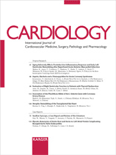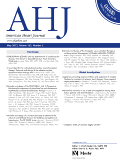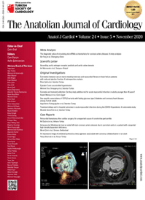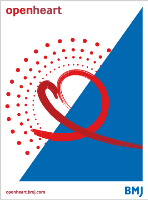
CARDIOLOGY
Scope & Guideline
Exploring the forefront of heart and vascular research.
Introduction
Aims and Scopes
- Clinical Research and Trials:
The journal emphasizes clinical research, particularly studies involving patient outcomes, treatment efficacy, and the long-term effects of various interventions in cardiovascular care. - Cardiovascular Risk Factors and Management:
It explores traditional and emerging cardiovascular risk factors, their impact on patient management, and the development of personalized treatment strategies. - Innovative Technologies and Techniques:
The journal showcases advancements in diagnostic tools, imaging techniques, and therapeutic interventions, including the use of telemedicine and point-of-care devices. - Epidemiology and Public Health:
Research addressing the prevalence, risk factors, and outcomes of cardiovascular diseases on a population level is a core focus, highlighting the importance of cardiovascular health in public health. - Genetic and Molecular Insights:
The journal includes studies that delve into the genetic and molecular underpinnings of cardiovascular diseases, aiming to bridge the gap between basic science and clinical application.
Trending and Emerging
- Telemedicine and Remote Monitoring:
Recent publications highlight the growing importance of telemedicine and remote patient monitoring technologies, especially in managing chronic cardiovascular conditions and during the COVID-19 pandemic. - Cardiac Biomarkers and Precision Medicine:
There is an increasing emphasis on the role of cardiac biomarkers in diagnosis, prognosis, and therapy personalization, reflecting a trend towards precision medicine in cardiology. - Intersection of Cardiovascular Disease and Systemic Conditions:
Emerging research is focusing on the interplay between cardiovascular diseases and systemic conditions such as diabetes, cancer, and COVID-19, indicating a broader view of patient health. - Machine Learning and AI in Cardiology:
The integration of machine learning and artificial intelligence in predicting outcomes and personalizing treatment strategies is gaining traction, signifying a technological evolution in the field. - Management of Heart Failure with Preserved Ejection Fraction (HFpEF):
Studies addressing the complexities of HFpEF management are on the rise, reflecting the growing recognition of this condition's prevalence and treatment challenges.
Declining or Waning
- Traditional Risk Assessment Models:
Research centered on conventional cardiovascular risk assessment models, such as the Framingham Risk Score, appears to be declining as newer, more nuanced models gain traction. - Invasive Procedures in Stable Patients:
There is a noticeable decrease in studies focusing on invasive interventions for stable cardiovascular patients, likely due to a growing emphasis on less invasive, evidence-based approaches. - Pharmacological Interventions without Comprehensive Lifestyle Considerations:
Studies that solely focus on pharmacological interventions without integrating lifestyle modifications in cardiovascular disease management are becoming less prevalent. - Single-Center Studies:
There has been a reduction in the number of single-center studies, with a shift towards multi-center collaborations that enhance the generalizability of research findings. - Historical Perspectives on Established Therapies:
Papers revisiting traditional therapies without exploring new evidence or advancements are becoming less common, as the field moves towards more innovative approaches.
Similar Journals

AMERICAN HEART JOURNAL
Uniting Experts for a Heart-Healthy FutureAMERICAN HEART JOURNAL, published by MOSBY-ELSEVIER, stands at the forefront of cardiovascular research, encompassing a vast array of studies focused on heart health, cardiology, and related medical therapies. Established in 1925 and set to continue its legacy into 2024, this esteemed journal holds a prestigious Q1 ranking in the category of Cardiology and Cardiovascular Medicine, reflecting its commitment to quality and significant influence in the field, as evidenced by its 85th percentile ranking in Scopus. With a dedicated readership of researchers, clinicians, and students, the journal serves as a critical platform for sharing groundbreaking findings, innovative techniques, and comprehensive reviews that strive to advance cardiovascular science. Although it does not currently offer open access, the AMERICAN HEART JOURNAL remains an indispensable resource for anyone invested in the evolution and improvement of heart health.

Heart International
Advancing cardiovascular knowledge for a healthier tomorrow.Heart International is a prominent open-access journal dedicated to the fields of cardiology and cardiovascular medicine, published by TOUCH MEDICAL MEDIA LTD since 2006. Based in Italy, this journal serves as a vital platform for researchers, clinicians, and students, aiming to disseminate cutting-edge scientific findings and clinical insights that advance the understanding of heart health. With an ISSN of 2036-2579 and an emphasis on accessible content, Heart International ensures that valuable research is available to a wide audience, thereby contributing to the global discourse on cardiovascular issues. Although it currently holds a Q4 quartile ranking in its category and is positioned in the lower percentile for Scopus rankings, the journal is committed to improving its impact through rigorous peer review and high-quality publications. The journal covers a wide array of topics within the cardiology domain, making it an essential resource for those looking to stay abreast of the latest developments in heart research.

Netherlands Heart Journal
Exploring Innovations in Heart Health and Disease ManagementNetherlands Heart Journal is a premier academic publication dedicated to advancing knowledge in the field of cardiology and cardiovascular medicine. Published by BOHN STAFLEU VAN LOGHUM BV, this journal has established itself as a critical platform for researchers, professionals, and students seeking to explore groundbreaking findings and innovative practices in cardiovascular health. With an ISSN of 1568-5888 and E-ISSN 1876-6250, the journal boasts a respectable Q2 ranking in the Cardiology and Cardiovascular Medicine category, placing it in the top half of its field according to the 2023 quartiles. The Scopus ranking places it 130th out of 387 in the relevant category, indicating a commendable percentile rank of 66th, which attests to its influence and quality of published research. Spanning from 2005 to 2024, the journal endeavors to include a diverse array of topics, encompassing clinical practice, technological innovations, and public health considerations related to cardiovascular diseases. Researchers and practitioners are encouraged to engage with the journal's robust content, contributing to and benefiting from the collaborative effort to enhance cardiovascular health worldwide.

Anatolian Journal of Cardiology
Connecting Global Hearts with Cutting-edge Cardiovascular Knowledge.The Anatolian Journal of Cardiology, published by KARE PUBL, stands as a vital resource in the field of Cardiology and Cardiovascular Medicine. With an ISSN of 2149-2263 and E-ISSN 2149-2271, this Open Access journal has been fostering the dissemination of critical research since 2001, ensuring that high-quality content is freely available to a global audience. Based in Turkey, the journal aims to bridge gaps in cardiological knowledge through rigorous peer-reviewed articles that span a wide range of topics, from innovative clinical practices to groundbreaking research findings. While its current ranking places it in the Q3 category of cardiology journals, the Anatolian Journal of Cardiology continues to strive towards enhancing its impact, currently holding a Scopus rank of 236 out of 387. Researchers, practitioners, and students alike will find this journal an essential platform for keeping abreast of the latest developments in cardiovascular health.

Frontiers in Cardiovascular Medicine
Empowering Researchers to Transform Cardiovascular Care.Frontiers in Cardiovascular Medicine is a leading open-access journal published by FRONTIERS MEDIA SA, dedicated to advancing research in the field of cardiology and cardiovascular medicine. Since its inception in 2014, the journal has become a vital platform for the dissemination of high-quality research, boasting a commendable Q2 rank in the 2023 category for Cardiology and Cardiovascular Medicine. With a focus on promoting innovative studies and clinical insights, Frontiers in Cardiovascular Medicine facilitates open access to its content, allowing researchers, healthcare professionals, and students from around the globe to engage with the latest findings which are critical for the advancement of cardiovascular health. The journal's significant presence in the academic landscape, as indicated by its Scopus ranking (161/387 and 58th percentile), underscores its importance as a research outlet in this essential field. Located in Lausanne, Switzerland, the journal continues to support the global cardiovascular community by encouraging collaboration and knowledge sharing to address the challenges faced in cardiovascular medicine today.

HEART
Pioneering Discoveries in Cardiovascular MedicineHEART is a leading peer-reviewed journal published by the BMJ Publishing Group, specializing in the field of Cardiology and Cardiovascular Medicine. Established in 1942, the journal has evolved as a premier platform for disseminating high-quality research, innovative practices, and clinical advancements within the cardiovascular domain. With an impressive impact factor and ranked in the Q1 category in 2023, it positions itself among the top-tier journals in its field, boasting a Scopus rank of #37 out of 387 in this highly competitive area, representing the top 10th percentile nationally. The journal supports both traditional and open access options, thereby enhancing the global visibility and reach of its published work. Researchers, professionals, and students alike will find HEART to be an invaluable resource, offering the latest insights and developments that drive the field forward and improve patient care worldwide.

Open Heart
Exploring Innovations in Heart HealthOpen Heart is a prestigious, peer-reviewed open access journal published by BMJ Publishing Group, focusing on the dynamic field of Cardiology and Cardiovascular Medicine. Launched in 2013, the journal has rapidly ascended to prominence, achieving a Q1 quartile ranking in its category as of 2023, reflecting its high-quality scholarly contributions. With an active publishing history from 2014 through 2024, Open Heart offers an expansive platform for researchers, clinicians, and students to disseminate and access groundbreaking research findings, reviews, and case studies that address critical issues in cardiovascular health. The journal is indexed in Scopus, ranking 133rd out of 387 in the Medicine - Cardiology and Cardiovascular Medicine category, placing it within the 65th percentile of its peers. Based in the United Kingdom, it promotes global research and collaboration in the cardiovascular domain, ensuring open access to vital knowledge for all stakeholders in the medical community. For access options and more information, visit the Open Heart website.

CJC Open
Elevating insights in cardiology and cardiovascular medicine.CJC Open is a leading open access journal published by Elsevier, focused on advancing the fields of Cardiology and Cardiovascular Medicine. Since its inception in 2019, the journal has committed to disseminating high-quality research and groundbreaking advancements in cardiovascular health. With its ISSN 2589-790X and an impressive Q2 ranking in its field, CJC Open aims to foster collaboration and communication among researchers, healthcare professionals, and students by providing a platform for innovative studies, reviews, and insights. The journal is indexed in Scopus, currently ranking at #191 out of 387 in its category, underscoring its relevance and impact in the academic community. As an open access journal, CJC Open ensures that research findings are widely available, promoting greater visibility and readership. Scientists and practitioners alike are encouraged to submit their work, further enriching the discourse in cardiovascular research. With a focus on quality and accessibility, CJC Open is poised to make significant contributions to the field through 2024 and beyond.

International Journal of Cardiology Cardiovascular Risk and Prevention
Innovating Strategies for Cardiovascular HealthInternational Journal of Cardiology Cardiovascular Risk and Prevention is a distinguished Open Access journal published by ELSEVIER, dedicated to advancing research in the realms of cardiology and cardiovascular medicine. With an ISSN of 2772-4875 and based in the Netherlands, this journal has rapidly established itself as a critical resource for academics and practitioners since its inception in 2021. The journal currently holds a respectable impact factor and occupies the Q2 quartile in both Cardiology and Cardiovascular Medicine and Internal Medicine categories, reflecting its commitment to sharing high-quality research. Researchers can take advantage of its open-access model, ensuring that cutting-edge findings are freely available to a global audience. The journal not only covers innovative studies on cardiovascular risk factors and prevention strategies but also aims to facilitate interdisciplinary collaboration. With an ongoing trajectory from 2021 to 2024, the International Journal of Cardiology Cardiovascular Risk and Prevention is poised to remain a pivotal platform for dialogue and discovery in the evolving landscape of cardiovascular health.

Cardiovascular Innovations and Applications
Empowering healthcare professionals with the latest cardiovascular innovations.Cardiovascular Innovations and Applications is a premier open-access journal dedicated to advancing knowledge in the field of cardiovascular medicine. Published by COMPUSCRIPT since 2016, this journal provides a platform for the dissemination of innovative research and applications that address crucial topics in cardiology, aiming to bridge the gap between clinical practice and cutting-edge research. With an ISSN of 2009-8618 and an E-ISSN of 2009-8782, it operates on a global scale, facilitating access to high-quality content without financial barriers. The journal is positioned within the Medicine - Cardiology and Cardiovascular Medicine category, and its current Scopus rank of #321/387 reflects its potential for growth and influence in the academic community, being in the 17th percentile. Researchers, healthcare professionals, and students will find Cardiovascular Innovations and Applications an invaluable resource in their quest for the latest findings and advancements in cardiovascular health and treatment methodologies.